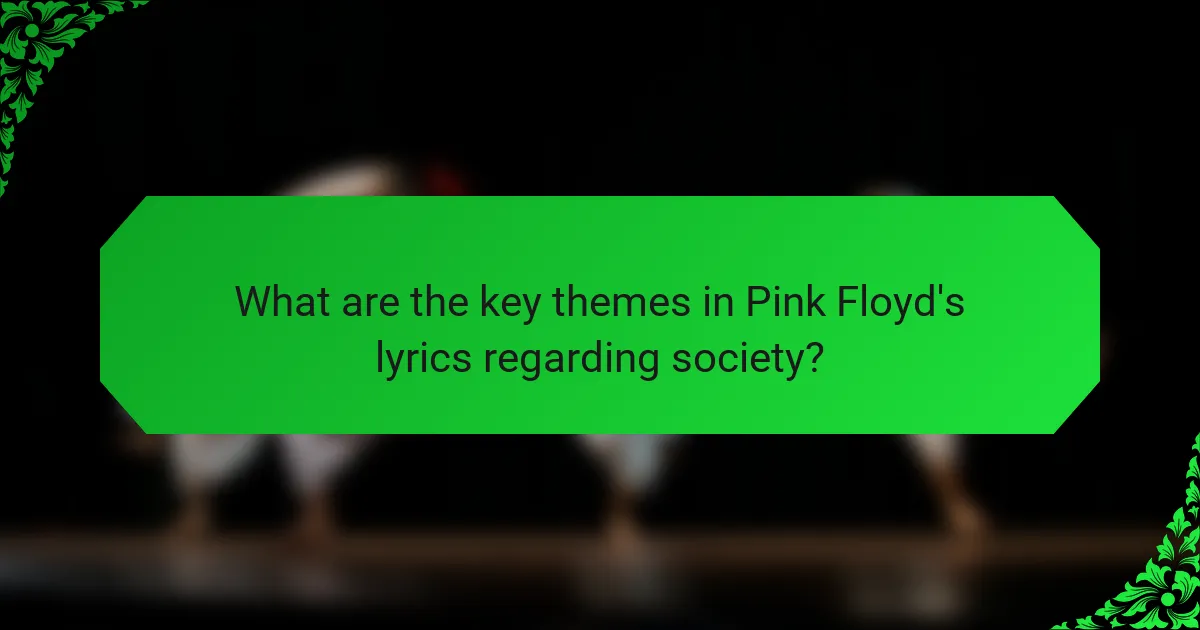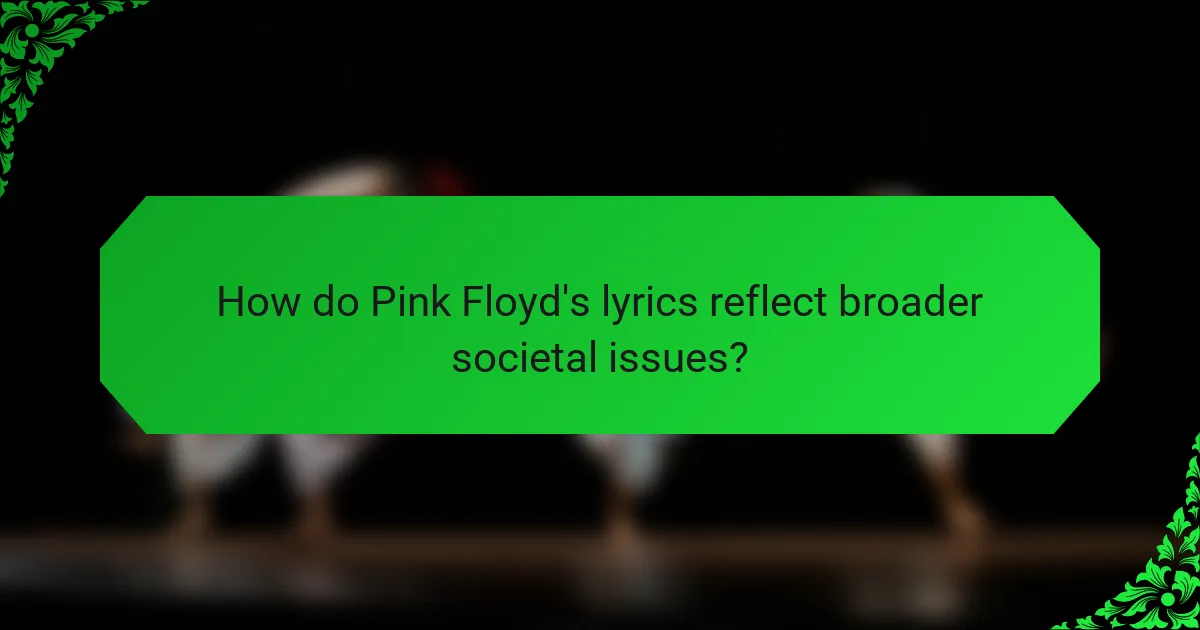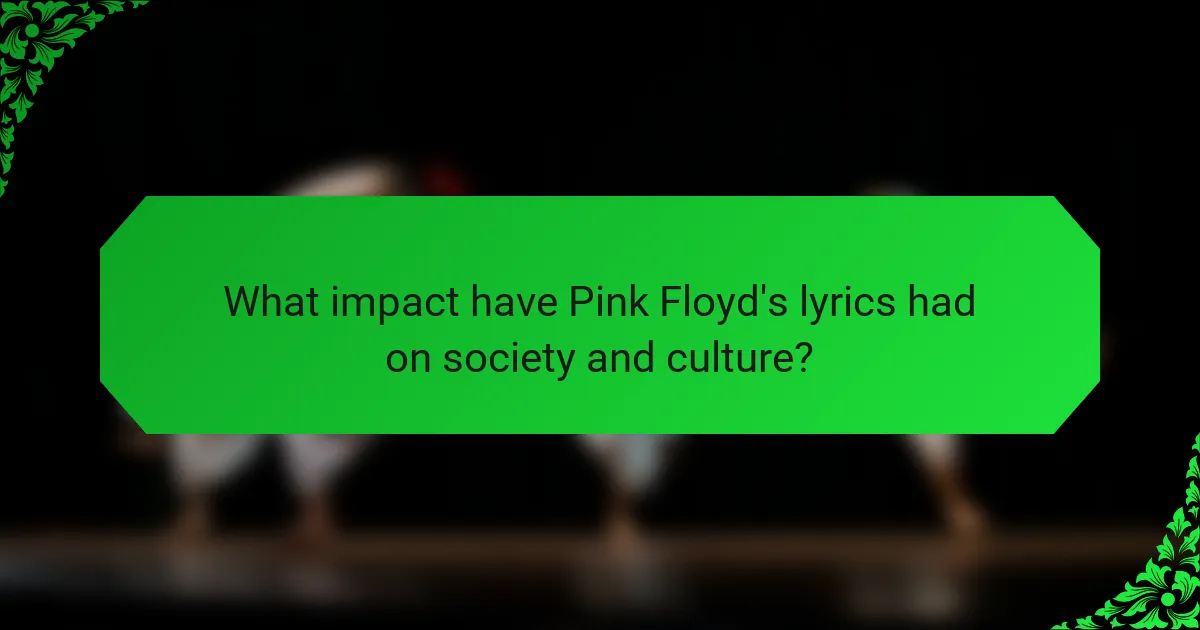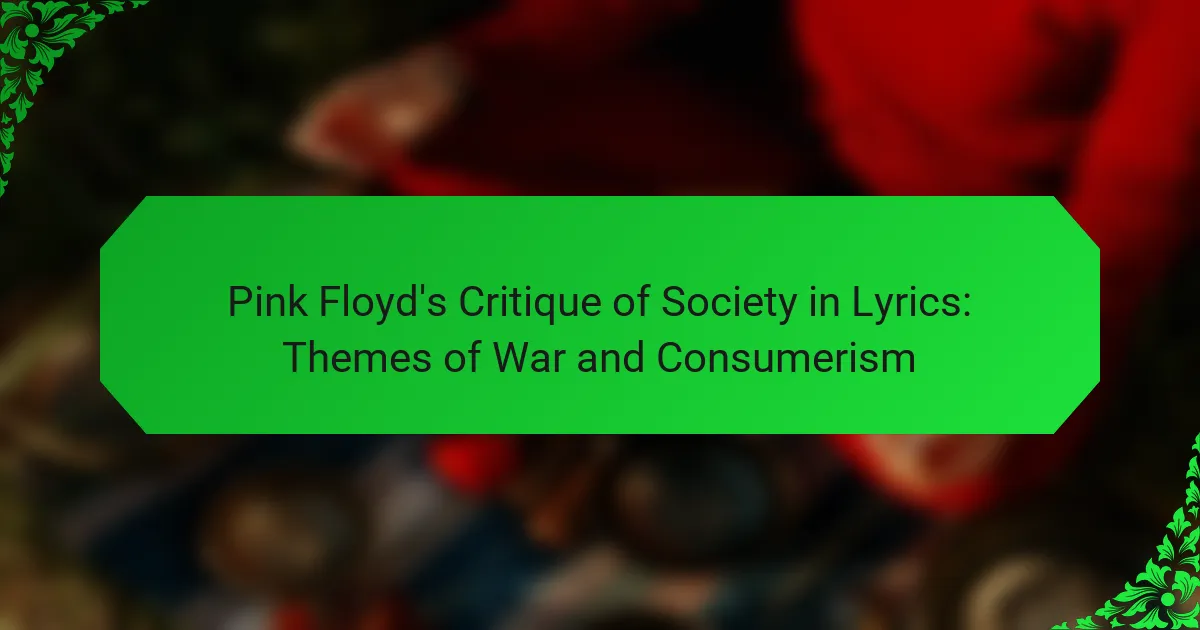Pink Floyd is a prominent rock band known for their thought-provoking lyrics that critique societal issues. The article explores key themes in their music, including alienation, war, and consumerism, highlighting how these elements reflect the dehumanizing effects of modern life. Notable songs such as “Another Brick in the Wall” and “Us and Them” serve as critiques of educational systems and societal divisions, respectively. The band’s work resonates with listeners by addressing the emotional struggles of contemporary existence and prompting discussions on authority and social change. Overall, Pink Floyd’s lyrics offer a critical commentary on the challenges faced in modern society.

What are the key themes in Pink Floyd’s lyrics regarding society?
Key themes in Pink Floyd’s lyrics regarding society include alienation, war, and consumerism. The band critiques the dehumanizing effects of modern life. They explore how societal structures can lead to isolation. Their song “Another Brick in the Wall” highlights the oppressive nature of educational systems. Lyrics often reflect the futility of war, as seen in “The Wall.” Consumerism is depicted as a means of control, diminishing individuality. The themes are woven throughout their albums, showcasing a consistent critique of societal norms.
How does Pink Floyd address the theme of war in their music?
Pink Floyd addresses the theme of war in their music through powerful lyrics and evocative soundscapes. Their album “The Wall” explores the psychological impact of war on individuals. The song “Another Brick in the Wall” critiques the dehumanization experienced in both war and education. “Dogs of War” explicitly condemns the military-industrial complex and the greed behind warfare. The band uses metaphors and imagery to illustrate the futility and devastation of conflict. Their music often reflects personal and societal trauma resulting from war. This thematic focus resonates with listeners, highlighting the emotional and social consequences of violence. Through their art, Pink Floyd critiques not only war but also the broader implications of societal indifference.
What specific songs reflect Pink Floyd’s critique of war?
“Another Brick in the Wall, Part 2,” “The Wall,” and “Us and Them” are specific songs that reflect Pink Floyd’s critique of war. “Another Brick in the Wall, Part 2” criticizes the dehumanizing effects of war on youth. The lyrics convey a sense of rebellion against an oppressive educational system that prepares children for conflict. “The Wall” explores themes of isolation and the psychological impact of war. It depicts the emotional barriers created by trauma. “Us and Them” addresses the division and conflict between groups, highlighting the futility of war. The song’s lyrics emphasize the human cost and the moral dilemmas faced during conflict. These songs collectively illustrate Pink Floyd’s profound critique of war and its consequences on society.
How do the lyrics convey the emotional impact of war?
The lyrics convey the emotional impact of war through vivid imagery and poignant language. They depict the horrors of battle and the psychological toll on soldiers. For example, phrases describe destruction and loss, evoking feelings of despair. The use of metaphors illustrates the futility of war, emphasizing its senselessness. Personal stories in the lyrics highlight individual suffering, making the impact relatable. Additionally, the contrast between innocence and brutality deepens the emotional resonance. Overall, the lyrics serve as a powerful critique of war’s devastating effects on humanity.
In what ways does Pink Floyd critique consumerism in their lyrics?
Pink Floyd critiques consumerism in their lyrics by highlighting the emptiness of material pursuits. Their song “Money” portrays greed as a corrupting force. The lyrics depict the relentless chase for wealth, illustrating how it leads to moral decay. In “Welcome to the Machine,” the band critiques the dehumanization within the consumerist system. It reflects the loss of individuality in a mechanized society. Furthermore, “Another Brick in the Wall” criticizes the educational system’s role in perpetuating conformity and consumer culture. The lyrics emphasize the suppression of creativity in favor of producing compliant consumers. Overall, Pink Floyd’s work serves as a powerful commentary on the negative impacts of consumerism on society and individual identity.
What songs illustrate the band’s perspective on consumer culture?
“Money” and “Welcome to the Machine” illustrate Pink Floyd’s perspective on consumer culture. “Money” critiques capitalism and materialism through its lyrics and sound effects. The song emphasizes the greed and corruption tied to financial pursuits. “Welcome to the Machine” reflects on the dehumanizing effects of industrialization and consumerism. It portrays a mechanized society that prioritizes profit over individuality. Both songs serve as powerful commentaries on the impact of consumer culture on human experience.
How do the lyrics challenge societal norms related to consumption?
The lyrics of Pink Floyd challenge societal norms related to consumption by critiquing materialism and consumer culture. They depict a world where individuals are trapped in cycles of consumption, losing their identity. The song “Money” illustrates how greed drives people to dehumanize others. It uses sound effects of cash registers and coins to symbolize the obsession with wealth. This auditory imagery reinforces the message that money corrupts. Additionally, the lyrics often highlight the emptiness of consumerism, suggesting that material possessions do not lead to fulfillment. By portraying these themes, Pink Floyd encourages listeners to question societal values surrounding consumption.

How do Pink Floyd’s lyrics reflect broader societal issues?
Pink Floyd’s lyrics reflect broader societal issues by addressing themes such as war, alienation, and consumerism. Their song “Another Brick in the Wall” critiques the education system and its role in shaping conformity. The lyrics highlight the dehumanizing effects of institutional structures. In “Time,” the band discusses the relentless passage of time and its impact on individual purpose. This resonates with societal pressures to achieve and succeed. “Us and Them” examines the division between people, particularly in the context of war and conflict. The song critiques the arbitrary nature of societal divisions. Overall, Pink Floyd’s work serves as a commentary on the struggles of modern life and the consequences of societal neglect. Their music remains relevant in discussions about the human condition and societal values.
What historical context influences Pink Floyd’s critique of society?
Pink Floyd’s critique of society is influenced by the socio-political climate of the 1960s and 1970s. This period was marked by significant events such as the Vietnam War and civil rights movements. The band’s lyrics reflect disillusionment with war and authority. The rise of consumerism also shaped their viewpoint. Economic changes led to a focus on materialism, which they criticized. Additionally, the counterculture movement fueled their artistic expression. The band’s experiences in a post-war Britain further informed their themes. These historical contexts provide a foundation for understanding their societal critiques.
How did the socio-political climate of the time shape their messages?
The socio-political climate significantly influenced Pink Floyd’s messages in their lyrics. The band emerged during a period marked by the Vietnam War and widespread social unrest. These events prompted them to critique war and consumerism in their work. For instance, their album “The Wall” reflects disillusionment with authority and the impact of war on individuals. The lyrics often convey a sense of alienation and critique of materialism. The anti-establishment sentiment prevalent in the 1960s and 1970s shaped their artistic expression. Their music served as a response to the political upheaval and cultural shifts of the time. This context helped solidify their messages as resonant and powerful critiques of society.
What events or movements are referenced in their lyrics?
Pink Floyd’s lyrics reference significant events and movements, particularly focusing on war and societal issues. Their song “Another Brick in the Wall” critiques the education system and its dehumanizing effects. “The Wall” as a whole addresses themes of isolation and the psychological impacts of war. “Us and Them” reflects on the futility of conflict, highlighting the division between people. The album “Animals” draws parallels to capitalism and social hierarchy, inspired by George Orwell’s “Animal Farm.” Additionally, “Wish You Were Here” mourns the loss of former band member Syd Barrett, symbolizing the impact of mental health issues. These references illustrate Pink Floyd’s commentary on the human experience amid societal challenges.
How do the themes of war and consumerism intersect in Pink Floyd’s work?
The themes of war and consumerism intersect in Pink Floyd’s work through their critique of societal values. The band often portrays war as a destructive force that fuels consumerism. For example, in “Another Brick in the Wall,” they highlight how war leads to a loss of individuality and promotes a culture of conformity. Additionally, “Money” critiques the capitalist system that thrives on war and exploitation. The lyrics reflect the idea that consumerism is a byproduct of the societal chaos created by conflict. This intersection illustrates how Pink Floyd connects the impact of war on human experience with the relentless pursuit of material wealth. Their music serves as a powerful commentary on the consequences of these intertwined themes.
What connections can be drawn between the critique of war and consumerism?
The critique of war and consumerism is interconnected through themes of exploitation and dehumanization. Both war and consumerism often prioritize profit over human life. In war, nations exploit human resources for economic gain. Similarly, consumerism promotes a culture of materialism, often at the expense of individual well-being. Pink Floyd’s lyrics illustrate this connection by highlighting the loss of individuality in both contexts. For example, in songs like “Another Brick in the Wall,” the band critiques the educational system that prepares individuals for a consumer-driven society. This reflects a broader commentary on how both war and consumerism strip away personal identity. The cyclical nature of violence and consumption further emphasizes that both phenomena perpetuate a cycle of discontent and alienation in society.
How do these themes resonate with listeners today?
Themes of war and consumerism in Pink Floyd’s lyrics resonate with listeners today due to ongoing global conflicts and materialistic culture. Many people experience anxiety from current geopolitical tensions, similar to the sentiments expressed in the band’s work. The critique of consumerism reflects the modern struggle with identity and fulfillment in a materialistic society. According to a 2021 survey by Pew Research Center, 72% of Americans feel overwhelmed by the pressure to keep up with consumer trends. This parallels the themes in Pink Floyd’s music, highlighting a shared sense of disillusionment. The band’s exploration of these themes continues to inspire discussions about societal values and personal integrity.

What impact have Pink Floyd’s lyrics had on society and culture?
Pink Floyd’s lyrics have profoundly influenced society and culture by addressing themes of war, alienation, and consumerism. Their song “Another Brick in the Wall” critiques the educational system, resonating with disaffected youth and sparking discussions on authority. The track became an anthem for anti-establishment sentiments in the late 1970s. Additionally, “Wish You Were Here” reflects on the disconnection in modern life, highlighting the emotional struggles many face. The band’s work has inspired movements advocating for social change and mental health awareness. Their lyrics often serve as a mirror to societal issues, prompting listeners to reflect on their own experiences. This cultural impact is evident in the continued relevance of their music in contemporary discussions about personal and societal challenges.
How have listeners and critics responded to Pink Floyd’s societal critiques?
Listeners and critics have generally responded positively to Pink Floyd’s societal critiques. Many listeners appreciate the band’s thought-provoking lyrics that address themes of war, consumerism, and alienation. Critics often highlight the band’s ability to blend music with social commentary, making their messages resonate deeply. For example, “The Wall” critiques the dehumanizing effects of war and isolation, receiving acclaim for its narrative depth. Additionally, the album “Animals” critiques capitalism, which has been noted for its sharp social analysis. Overall, the band’s critiques have sparked discussions about societal issues, reflecting their impact on both listeners and critics alike.
What are some notable interpretations of their lyrics?
Notable interpretations of Pink Floyd’s lyrics focus on critiques of war and consumerism. Their song “Another Brick in the Wall” symbolizes the dehumanizing effects of the educational system. The lyrics convey a message against authoritarianism and conformity. In “Money,” the band critiques capitalism and the greed associated with wealth accumulation. The song’s structure reflects the chaotic nature of financial systems. “Us and Them” explores themes of division and conflict, highlighting the absurdity of war. The lyrics suggest a commentary on societal polarization. Overall, Pink Floyd’s lyrics serve as a profound reflection on the darker aspects of modern life.
How have their themes influenced other artists and genres?
Pink Floyd’s themes of war and consumerism have significantly influenced various artists and genres. Their work has inspired numerous rock bands to explore similar socio-political themes in their music. For example, bands like Radiohead and Muse incorporate critiques of modern society, reflecting Pink Floyd’s impact.
Additionally, their concept albums have shaped the progressive rock genre, encouraging artists to create cohesive narratives within their music. The thematic depth of Pink Floyd’s lyrics has led to a broader acceptance of introspective and critical content in popular music.
Moreover, their exploration of existential themes has resonated with genres like alternative rock and electronic music. Artists across these genres often reference Pink Floyd’s soundscapes and lyrical complexity in their own work. This influence is evident in the emphasis on atmospheric sounds and reflective lyrics in contemporary music.
What lessons can be learned from Pink Floyd’s critique of society?
Pink Floyd’s critique of society teaches several important lessons. One lesson is the dangers of alienation in modern life. Their lyrics often depict feelings of isolation and disconnection from society. Another lesson is the critique of war and its dehumanizing effects. The song “Another Brick in the Wall” illustrates how education can suppress individuality. Additionally, Pink Floyd addresses consumerism’s impact on human values. They highlight how materialism can overshadow genuine human connections. These themes resonate with listeners, prompting reflection on societal issues. Their work encourages critical thinking about personal and collective experiences in a consumer-driven world.
How can today’s artists address similar themes in their work?
Today’s artists can address themes of war and consumerism by utilizing various mediums and styles. They can create visual art, music, and literature that reflect societal issues. Artists may draw inspiration from historical events, similar to Pink Floyd’s approach. They can incorporate personal experiences to provide a unique perspective. Collaborations with activists can enhance the impact of their message. Engaging with digital platforms allows for broader audience reach. Artists can use symbolism to convey complex ideas succinctly. By participating in discussions and exhibitions, they can foster community dialogue. This approach promotes awareness and encourages critical thinking among audiences.
What practical insights can we gain from analyzing Pink Floyd’s lyrics?
Analyzing Pink Floyd’s lyrics provides insights into societal critiques, particularly on war and consumerism. The band often addresses themes of alienation, reflecting the impact of modern life on individuals. Their song “Another Brick in the Wall” critiques the education system and conformity. This highlights the loss of individuality in a consumer-driven society. Additionally, “Us and Them” explores the division created by war and conflict. The lyrics encourage listeners to question authority and societal norms. Pink Floyd’s work serves as a commentary on the consequences of materialism and the human experience. These insights remain relevant in today’s discussions on social issues.
Pink Floyd’s lyrics serve as a profound critique of society, focusing on key themes such as war and consumerism. The band addresses the dehumanizing effects of modern life, highlighting alienation and the psychological impacts of conflict. Specific songs like “Another Brick in the Wall” and “Money” illustrate their condemnation of oppressive systems and materialism. Additionally, the historical context of the 1960s and 1970s shapes their messages, reflecting societal issues that remain relevant today. Overall, Pink Floyd’s work prompts critical reflection on the consequences of war and consumer culture in contemporary society.
